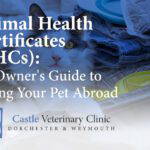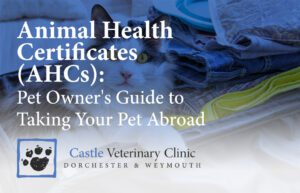The weighty issue of the portly pet
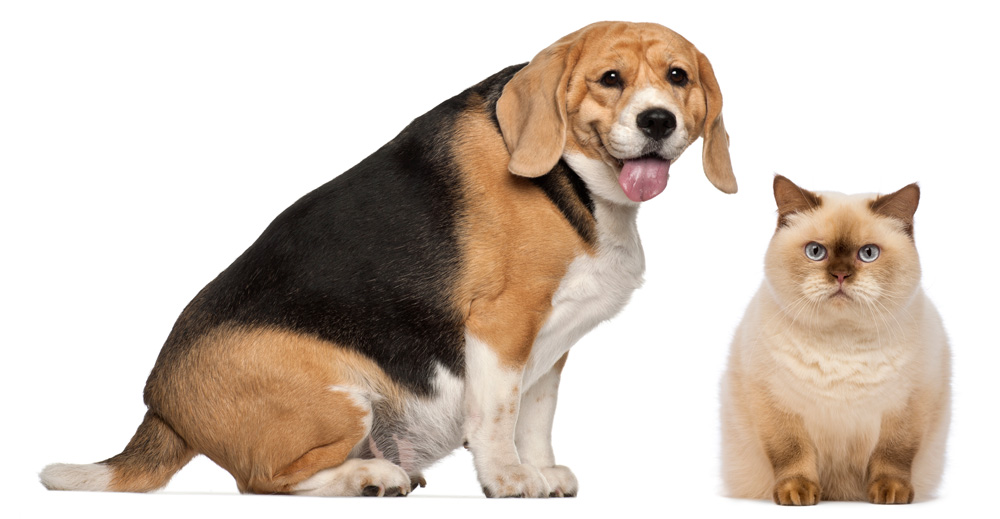
Overweight pets – a growing trend
Our pets are mirroring the human obesity growth curve, and very overweight cats and dogs are becoming common. As in humans, being overweight can cause many health issues for our pets. These include:
- Diabetes
- Arthritis, joint and mobility problems
- Increased frequency of joint injuries
- High blood pressure
- Skin and coat problems
- Urinary disease
- Heart disease
- Shorter lifespan than fitter pets
- Tendency to interact less with their families.
The term obesity is used to describe a condition that is more serious than just being overweight. When a dog or cat is classed as obese, it means that their fat has now reached the stage where their bodies struggle to maintain good health.
In 2018, results of an online survey* suggested that around 59% of dogs and 53% of cats throughout the world are obese. In fact, this rapidly increasing problem is now so significant that the World Small Animal Veterinary Association have officially classed canine obesity as a disease.
But it’s not always obvious to us…
This survey also showed that only 24% of owners thought their pet was overweight. This suggests pet owners not realising that their pet is obese has also become a big part of the problem. When you see your pet every day, and pets around you are slowly getting bigger too, a larger size becomes normal.
Why is obesity becoming more common?
The science behind overweight pets is usually as simple as it is in humans – more often than not a pet is obese because they’re eating more calories than they’re burning off. There are occasions where genetics or other health factors play a part, and some breeds are more likely to gain fat than others. There might also be some medical reasons that are contributing, for example, undiagnosed joint pain restricting their movement, or an underactive thyroid slowing down their metabolism.
Before starting your pet on a diet or increased exercise schedule, you should book a FREE weight clinic check-up with one of us to make sure there aren’t any underlying medical issues.
Not already a member?
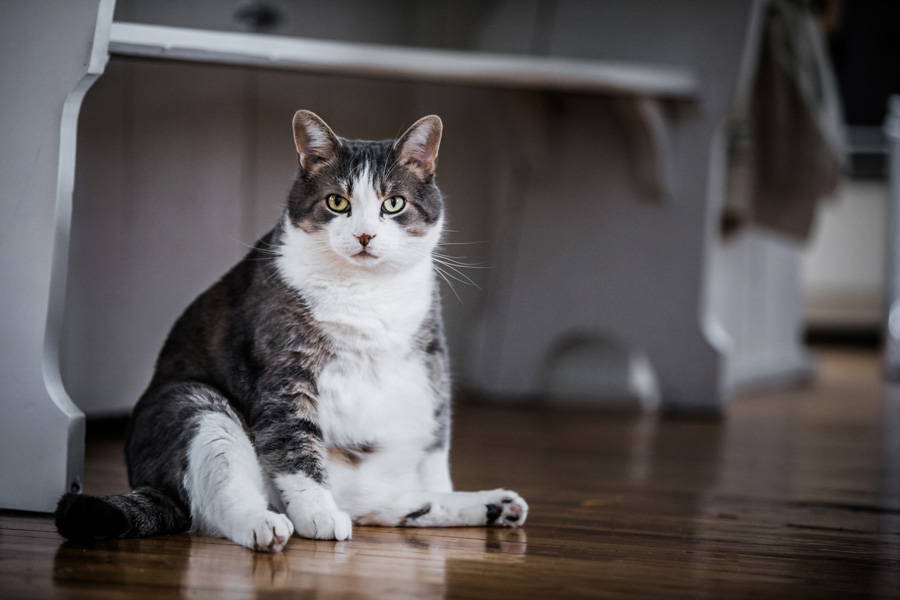
How do I know if my pet is overweight?
There are some visual checks you can do at home that will give you an idea of their condition:
- You should be able to see their ribs under their coat, or if they have a thick coat, you should be able to feel them.
- A clearly defined waist should be visible from the side and from above
- When you look at them from the side, you shouldn’t be able to see a rounded or saggy belly
I think my pet is overweight. What should I do?
More pets are being fed complete diets in the form of biscuits, and this has resulted in well-nourished animals, as the nutritional quality of the food makes sure they get all they need. The downside of biscuits is that it’s easy for us to fill their bowl each day as that seems like the right amount to give them, and it’s often way too much.
To ensure they aren’t consuming more calories than they need, check the pet food packaging. Many pet foods come with a cup with a portion size printed on the side. If not, weigh the food using kitchen scales until you get an idea about how much they should have each day, then split that across their meals.
Take care with extra treats! For a small dog, one biscuit can be the additional calorie equivalent of a burger.
Below is a comparison of some common treats for pets in human terms:
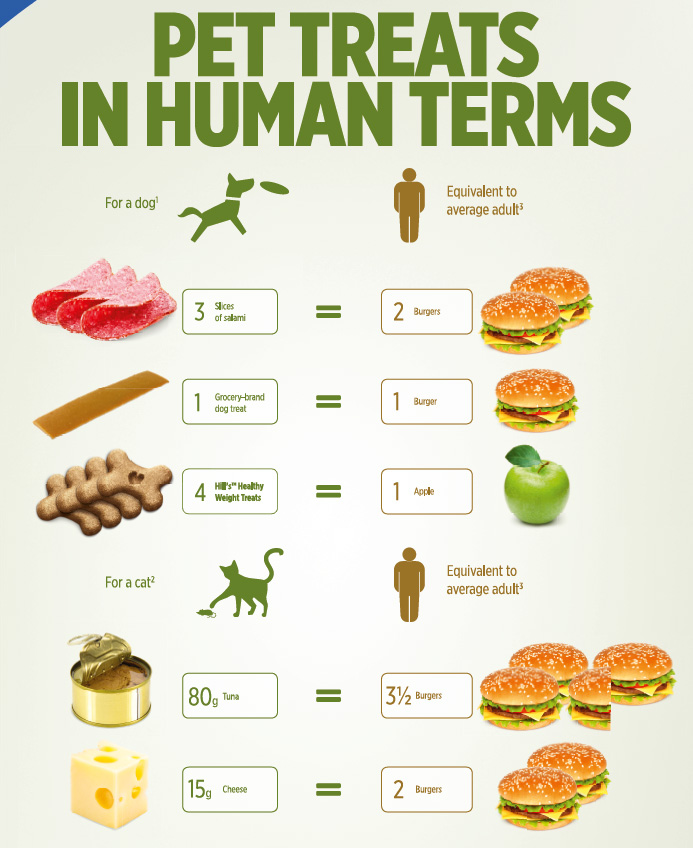
Source: https://www.hillspet.co.uk/pet-care/nutrition-feeding/human-food-treat-translator
How much exercise should pets have?
Dogs need to be walked every day, although the amount of exercise they need varies depending on their breed, age, size and general health. Your dog should be either walking or running for between 30 minutes and two hours daily. Hunting and working breeds need the most exercise and plenty of time to run around and explore off the lead.
Cats will only do exactly what they want when they want. This includes active time, and they’ll control their own, although you can encourage them to want to move around by getting some irresistible-to-cats toys – lights that move around, balls to chase around tubes, feathers on sticks, and small cat toys are often enjoyed but try a few and see which ones result in a playful cat.
The best approach to weight management is to monitor and prevent excessive weight gain
As many of us know from personal experience, losing weight can be boring and difficult. It’s much easier to maintain weight by making tweaks to food intake and exercise when needed, and better for long-term health too. It’s also good to have support, as denying your pet simples pleasures can be as hard for us as it is for them, even when we know we’re doing it because we love them. That’s where our weight clinics can help…
FREE weight clinics for our clients
Our pet weight clinic aims to improve the health and overall fitness of your pet. We do this by holding regular appointments with our friendly and non-judgemental nurses in which we weigh and measure your pet and discuss diet.
We will track your pet’s weight loss over time by measuring your pets neck, widest part of the chest and waist. We also weigh and body condition score to build up a full picture of their overall progress.
With your consent we also take pictures before, during and after weight loss as it’s not always easy to see the progress when you see them every day.
If you think this service would be useful for you or you’d just like to check that your pet is the right weight, call to make a free appointment on Dorchester (Poundbury) 01305 267083 or Weymouth 01305 81330
Not already a member?
*The survey was conducted online during January and February 2018. The total sample size was 5,309 cat and dog owners who were responsible for their pet’s health and well-being (Brazil 1,068; China 1,036; Russian 1,111; United Kingdom 1,023 and United States 1,071).



